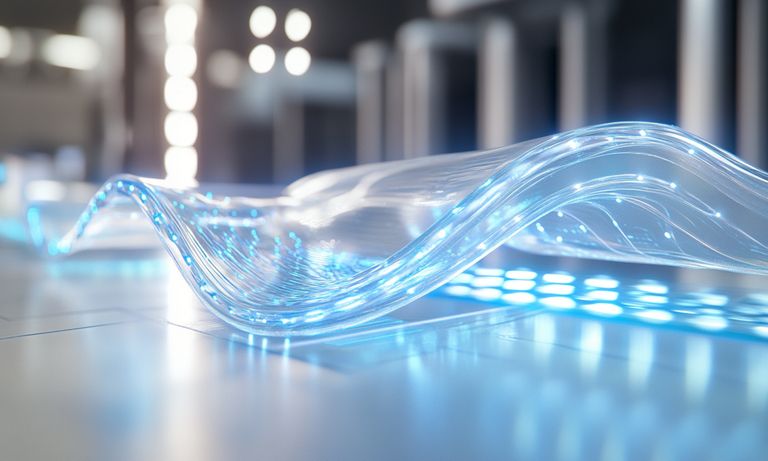
Source
A piezoelectric material is a substance capable of generating electricity when a mechanical force, such as pressure or vibration, is applied to it, due to a property known as the piezoelectric effect. This phenomenon occurs in certain materials that have an asymmetric crystalline structure. When subjected to mechanical stress, the ions within their structure are redistributed, creating a difference in electrical charge, which generates a usable voltage.
Un material piezoeléctrico es una sustancia capaz de generar electricidad cuando se le aplica una fuerza mecánica, como presión o vibración, debido a una propiedad conocida como el efecto piezoeléctrico. Este fenómeno ocurre en ciertos materiales que tienen una estructura cristalina asimétrica. Al ser sometidos a estrés mecánico, los iones dentro de su estructura se redistribuyen, creando una diferencia de carga eléctrica, lo que genera un voltaje aprovechable.
Classic examples of piezoelectric materials include quartz, certain types of ceramics, and synthetic crystals such as chalcogenide perovskites, used in the innovative material we will discuss today. These properties make piezoelectric materials essential in technologies such as microphones, piezoelectric lighters, and sustainable energy generation systems.
Ejemplos clásicos de materiales piezoeléctricos incluyen cuarzo, ciertos tipos de cerámica, y cristales sintéticos como las perovskitas calcogenuro, utilizadas en el material innovador que hoy comentaremos. Estas propiedades hacen que los materiales piezoeléctricos sean esenciales en tecnologías como micrófonos, encendedores piezoeléctricos, y sistemas de generación de energía sostenible.

Source
Now a group of researchers at Rensselaer Polytechnic Institute have developed a new material with piezoelectric properties that can generate electricity from mechanical energy when compressed or subjected to stress. It is a polymeric film infused with a special chalcogenide perovskite compound, which gives it great flexibility and adaptability.
Ahora un grupo de investigadores del Instituto Politécnico Rensselaer, han desarrollado un nuevo material con propiedades piezoeléctricas capaz de generar electricidad a partir de la energía mecánica, cuando este material se comprime o se somete a estrés. Se trata de una película polimérica infundida con un compuesto especial de perovskita calcogenuro, lo que le otorga una gran flexibilidad y adaptabilidad.
The material is just 0.3 millimeters thick, allowing it to be easily integrated into a variety of structures and devices. Suggested applications include roads that generate energy as vehicles drive by, buildings that harness their natural vibrations to produce electricity, and wearable devices such as clothing or accessories illuminated by human movement.
El material tiene un grosor de solo 0.3 milímetros, lo que permite integrarlo fácilmente en diversas estructuras y dispositivos. Entre las aplicaciones sugeridas se incluyen carreteras que generan energía al paso de vehículos, edificios que aprovechan sus vibraciones naturales para producir electricidad, y dispositivos portátiles como ropa o accesorios iluminados por el movimiento humano.

Source
The advantages of this new material are clear: it converts mechanical energy into electrical energy directly and efficiently, and it is resistant and durable, ensuring a long lifespan. It can be adapted to different shapes and sizes, making it easy to integrate into various devices and structures. During testing, the material was able to turn on LEDs with simple movements such as walking or clapping, proving its effectiveness.
Las ventajas de este nuevo material son claras, convierte la energía mecánica en eléctrica de manera directa y eficiente, es resistente y duradero, lo que garantiza una larga vida útil. Se puede adaptar a diferentes formas y tamaños, lo que facilita su integración en diversos dispositivos y estructuras. Durante las pruebas, el material logró encender LEDs con movimientos simples como caminar o aplaudir, demostrando su eficacia.
In addition, the researchers highlight their commitment to sustainability, as this material does not contain lead, thus avoiding toxicity problems present in traditional piezoelectric technologies. In the future, they plan to optimize the material using artificial intelligence to explore other compositions with higher performance. This breakthrough could revolutionize the way we generate renewable energy in infrastructure and everyday devices.
Además, los investigadores destacan su compromiso con la sostenibilidad, ya que este material no contiene plomo, evitando así problemas de toxicidad presentes en tecnologías piezoeléctricas tradicionales. A futuro, planean optimizar el material utilizando inteligencia artificial para explorar otras composiciones con un mayor rendimiento. Este avance podría revolucionar la forma en que generamos energía renovable en infraestructuras y dispositivos cotidianos.
More information/Más información
https://news.rpi.edu/2024/10/15/harnessing-vibrations-rpi-engineered-material-generates-electricity-unexpected-source#:~:text=The%20RPI%20team%20developed%20a,applications%20in%20transportation%20and%20infrastructure.